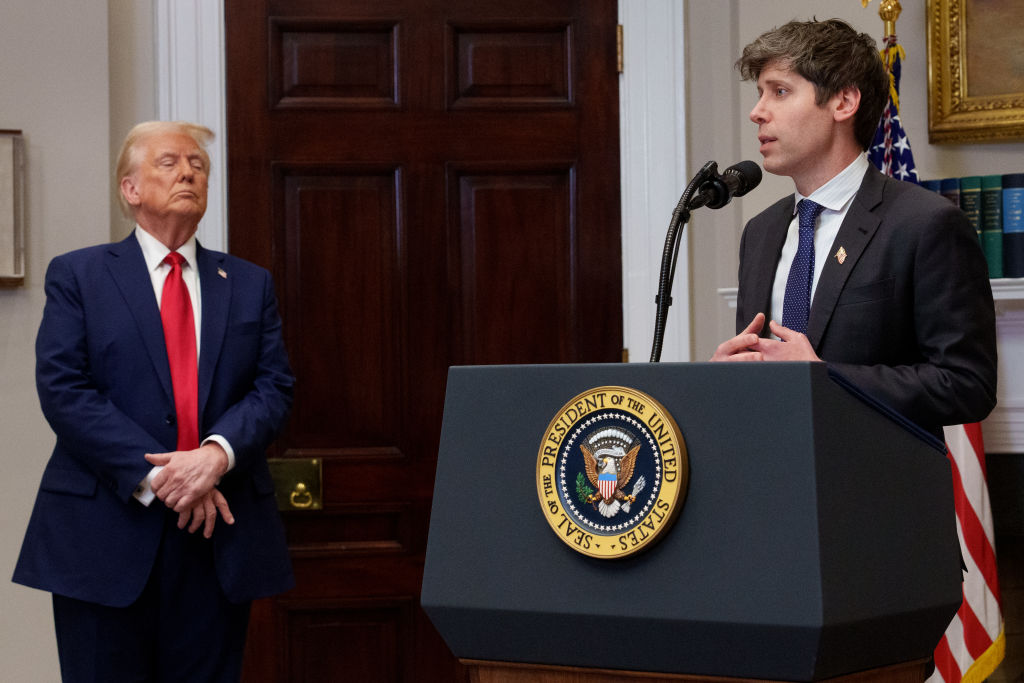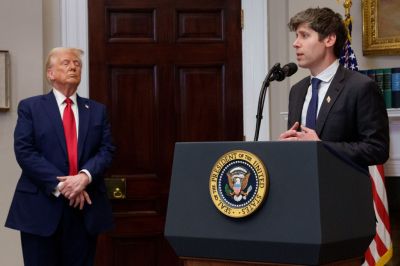Happy Monday! The final four of 43 monkeys who escaped from a research facility in South Carolina in November have been captured and returned to captivity. We give it a week before they receive their presidential pardons and are back on the street.
Quick Hits: Today’s Top Stories
- Israel on Saturday welcomed home four female hostages—Israeli soldiers Liri Albag, Daniella Gilboa, Karina Ariev, and Naama Levy—from terrorist captivity after 477 days in the Gaza Strip. Their return coincided with Israel’s release of some 200 Palestinian prisoners, more than half of whom had been serving life sentences, into the West Bank, East Jerusalem, and—in the case of serious offenders—the neighboring countries of Qatar and Turkey. On Monday morning, Hamas confirmed that displaced Palestinians had begun to return to northern Gaza as part of the U.S.-brokered ceasefire and hostage release agreement.
- The White House announced on Sunday the extension of a Lebanon-Israel ceasefire agreement, giving the Israel Defense Forces (IDF) until February 18 to withdraw from southern Lebanon as the original deadline passed over the weekend. Israeli Prime Minister Benjamin Netanyahu had signaled the military’s plan to remain in Lebanon beyond the 60-day period on Friday, citing the Lebanese government’s failure to fully enforce the November deal that ended more than a year of fighting between Israel and Hezbollah, the Iranian-backed terrorist group. On Sunday, Israeli troops opened fire on Hezbollah supporters who began to return to southern Lebanon in defiance of an IDF evacuation order, killing 22 people, according to Lebanon’s health ministry.
- The United Nations on Friday barred its personnel from traveling to areas of Yemen controlled by the Houthi rebels, after the Iranian-backed terrorist group detained seven U.N. employees on Thursday. The staff were arrested near the capital of Sana’a, where they were working to provide food and medical aid to the war-torn country. The detentions add to the 16 U.N. personnel already held by the Houthis, as well as staffers affiliated with other aid groups and international organizations—20 Yemeni employees of the shuttered U.S. embassy in Sana’a have been in Houthi custody since 2021.
- South Korean prosecutors indicted President Yoon Suk Yeol on insurrection charges on Sunday, in connection to his brief and failed declaration of martial law in December. Yoon—who was suspended from his duties on December 14 and will remain in jail until the trial’s conclusion—has signaled plans to contest the charges, with his legal team arguing that martial law declarations can never amount to insurrection. A separate case before the Constitutional Court will decide whether Yoon will be dismissed or reinstated as president. His defense minister, police chief, and multiple military officers have also been arrested for various charges related to the martial law incident.
- Belarusian leader Alexander Lukashenko declared victory in his country’s presidential election on Sunday, claiming to have won more than 87 percent of the vote in a contest widely denounced as fraudulent. Lukashenko, often described as “Europe’s last dictator,” has held power in the Eastern European country for more than 30 years. The muted public response in Belarus is a marked contrast to the election four years ago, when Lukashenko’s claim to victory sparked widespread protests and a violent police crackdown.
- U.S. immigration and defense officials transported 80 illegal immigrants back to Guatemala on Friday, using two Air Force jets in the first deportation flights of the new Trump administration. U.S. authorities attempted to land two additional deportation planes in Colombia on Sunday but were denied entry by the Colombian government, with President Gustavo Petro saying that Washington “can’t treat Colombian migrants like criminals.” In response, President Donald Trump announced plans to implement 50 percent tariffs on the country and travel restrictions against its citizens, prompting Petro to reverse course hours later. The White House said Sunday that Colombia had agreed to the “unrestricted acceptance” of all Colombian nationals in the U.S. illegally “without limitation or delay.”
- The Central Intelligence Agency released a report on Saturday assessing that the COVID-19 pandemic most likely resulted from a lab leak in China, though it added that the agency had low confidence in the conclusion. The finding marked a departure from the CIA’s previous decision to hold off on declaring whether the virus spread from a Chinese research lab or emerged naturally, from a wet market, and followed John Ratcliffe’s confirmation as CIA director on Thursday. Ratcliffe has long favored the lab leak theory and vowed to provide more transparency in the intelligence community’s investigations into the pandemic’s origins.
- President Trump on Friday fired 18 inspectors general from multiple federal agencies, including the departments of State, Defense, and Health and Human Services. The decision paves the way for the independent watchdogs—which monitor government agencies to prevent waste, fraud, and abuse—to be replaced by the president’s own picks. Over the weekend, multiple Republican and Democratic lawmakers pushed back on the firings as a violation of the Inspectors General Act, which mandates a 30-day detailed notice to Congress before firing inspectors general. “I did it because it’s a very common thing to do,” Trump told reporters Saturday evening. “Some people thought that some were unfair or were not doing the job. It’s a very standard thing to do, very much like the U.S. attorneys.”
- The Senate voted 51-50 to confirm Pete Hegseth as secretary of defense on Friday evening, with Vice President J.D. Vance breaking the tie after Republican Sens. Mitch McConnell, Lisa Murkowski, and Susan Collins joined Democrats in opposing the nominee. Also on Friday, the Senate voted 59-34 to confirm Kristi Noem as head of the Department of Homeland Security. All Republicans present voted yes, with seven Democrats joining.
A New AI Era?

President Donald Trump might have too many tech CEOs in the kitchen, as the saying goes.
Just hours after Trump announced Stargate—a $500 billion joint venture between OpenAI, SoftBank, and Oracle aimed at building artificial intelligence (AI) infrastructure in the U.S.—on Tuesday, Elon Musk took to X to give his two cents. “They don’t actually have the money,” he claimed in a post responding to the news. If it wasn’t immediately clear that the comment was a jab at the project’s main champion, Sam Altman, Musk clarified any confusion by calling the OpenAI CEO a “liar” and a “swindler” the following day.
Trump, for his part, shrugged off the spat. “Elon doesn’t like one of those people,” he told reporters Friday. “I have certain hatreds of people too.” But the clash’s reverberations go beyond petty personal rivalries. Set against the backdrop of a rapidly transforming industry, it may be Trump’s first glimpse into the difficulties of navigating AI policy in the early days of a technology driven by big personalities and ...
As a non-paying reader, you are receiving a truncated version of The Morning Dispatch. You can read our 1,353-word item on the new AI environment in the members-only version of TMD.
Worth Your Time
- Writing in the New York Times, Ross Barkan declared an end to the era of hyperpolitics: the sense of all-encompassing political conflict that dominated the period before, during, and after Trump’s first term. “To be on one side and against the other was to be consumed with a style of activism that demanded righteousness. Fervor was the currency and ‘moral clarity’ the catchword. Nuance was discarded; against Trump, the world-historical menace, who had time for it? By 2020, stopping Trump was the overriding theme of the election, with the pandemic as the inescapable backdrop. In that same year came the killing of Floyd, triggering the largest mass protests in American history,” he wrote. “But those same pathologies did not take over the 2024 presidential election. It had its culture-war fodder and circumstantial peculiarity—the 11th-hour Kamala Harris ascension, Trump’s third straight nomination—but in the end it proved rather ordinary. … Now that it’s done, with relatively few on the left genuinely shocked by Trump’s win, accommodation and acceptance are the new watchwords.”
- Anna Nicolaou of the Financial Times reported on the rise of the “podcast bros” and their role in building grassroots support for the Trump campaign in 2024. “There is a huge, and growing, media world that is hidden from sight for mainstream audiences. Today’s podcast stars are both very famous—filling up Madison Square Garden, for example—yet also unknown to large portions of Americans. My parents, who are in their seventies and still keep ‘the news’ humming on their TV set all day, have never heard of them. For younger generations, YouTube has supplanted cable television,” she wrote. “These podcasters don’t tend to fit neatly into a typical left or right ideological profile—although there’s a through-line of contempt for ‘the establishment’ and resistance to political correctness.”
Presented Without Comment
DC News Now: Republican Congressman Introduces Bill To Rename Washington Dulles International Airport After Trump
“We have entered the golden age of America largely thanks to President Trump’s leadership,” [GOP Rep. Addison] McDowell stated in a news release.
“It is only right that the two airports servicing our nation’s capital are duly honored and respected by two of the best presidents to have the honor of serving our great nation,” he continued, alluding to Reagan National Airport (DCA) in Arlington, Va.
Also Presented Without Comment
Mediaite: J.D. Vance Goes to the Mat for Trump’s Blanket Jan. 6 Pardons—Just Days After He Insisted Violent Rioters ‘Obviously’ Wouldn’t Be Pardoned
In the Zeitgeist
The Eagles are in the Super Bowl again, which means the return to prominence of one of the NFL’s most … spirited … fan bases. Happy pole climbing, Philadelphia!
Toeing the Company Line
- In the newsletters: Nick Catoggio contemplated (🔒) the probable political futures of the newly pardoned January 6 rioters, Jonah Goldberg dissected recent arguments over fascism and Marcus Garvey, and in Dispatch Faith, Gregory Jensen looked into the flood of young men joining Eastern Orthodox churches.
- On the podcasts: Jonah ruminated on Curtis Yarvin’s strange ideas about monarchy, and on today’s episode of The Dispatch Podcast, Jamie Weinstein and Jane Coaston make predictions about Donald Trump’s second term.
- On the site over the weekend: Victoria Holmes reported on Gen Z’s gravitation toward Catholicism and James Scimecca welcomed the return of the National Zoo’s cutest occupants: pandas.
- On the site today: Nick Baker explains the rise of memecoins and Charles Hilu reports on the pro-life movement’s expectations for Trump from this year’s March for Life. And in this week’s Monday Essay, Stephanie Murray writes about falling fertility rates and the societal importance of children.









